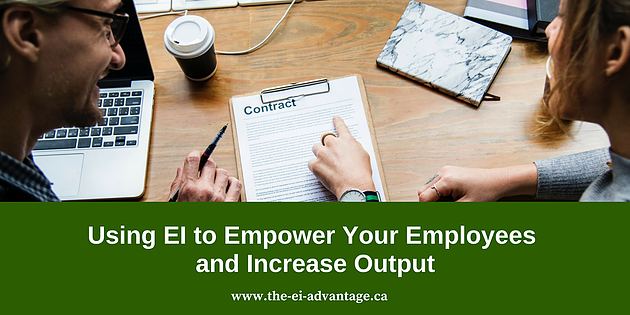Blog
Using EI to Empower Your Employees and Increase Output
August 24, 2018

Every year, companies across North America lose between $450 billion and $550 billion due to low productivity that results from a lack of employee engagement (source: Gallup)
These losses often continue year after year, despite efforts from management to develop programs designed to make staff happier and more satisfied.
While many of the tactics that businesses have tried attempt to add fun and excitement to an otherwise boring workday (free food, bring your dog to work, etc.), they most often fail to keep productivity levels high and employees happy.
Why is this happening? Why are employees continuing to struggle to feel engaged at work even though companies are investing in systems to increase engagement and empower their staff to succeed?
The reason is simple: companies are focusing on external mechanisms to drive happiness when they should be looking inward.
We Make Assumptions About Engagement
Classical economic theory, which dominates the business sector, often presumes that people will behave rationally. However, as anyone who has had a workplace conflict, a fight with their child, or a disagreement with their partner can attest to: people don’t always behave rationally.
In theory, things like free lunches, dog days, and other perks might seem positive, but in fact they are likely to be viewed by employees as attempts to manipulate or control their behavior.
Instead, business leaders should focus on fostering work environments that create a deep sense of motivation among their teammates. Take a look at the findings from from Richard Deci, author of Why We Do What We Do, who outlines some factors associated with deep motivation:
- A sense of autonomy
- A feeling of competence
- The ability to relate to the broader work of the organization
- Feeling a connection to the community of employees
You’ll notice that none of these factors have to do with specific material perks, but rather speak to the importance of fostering a sense of employee empowerment that inspires action.
Using EI to Empower Employees
If we want to reduce the $350 billion lost annually due to low employee engagement, then it’s time to start creating workplaces that focus on employee autonomy, competence, and healthy and positive relationships.
How can leaders begin developing these workplaces? Take a look at a few actionable ways you can leverage your emotional intelligence in order to empower your employees and increase output:
Invest in Yourself First
Start this process by investing in your own emotional intelligence (EI).
Becoming aware of how your emotions influence yourself and others will help you appreciate how your words and actions support each employee’s competence, autonomy, and feelings of relatedness within the workplace.
Delegate Without Removing Autonomy
Leaders who develop and use their EI are less reactive and more responsive during times of stress.
Developing your EI and becoming more in tune with your own emotions will allow you to apply what you’ve learned to realize how different team members react to change, stress, and other situations that might make them feel unheard or undervalued within the organization.
Understanding how different team members react, and learning to manage how you react to them, allows you to collaborate with others and delegate tasks while allowing employees to maintain a sense of autonomy while at work.
Put in The Effort
Emotionally intelligent leaders are people who put effort into their relationships and take action when they sense something is wrong.
By addressing and resolving workplace conflicts or issues quickly and in a positive manner, leaders with high EI can navigate difficult personal challenges that may negatively impact employee engagement and productivity.
Empower Your Employees with EI
Developing your emotional intelligence will help you discover how to effectively manage people at an individual, emotional level, and make sure that they always feel involved and appreciated at work.
The best employees are those who are driven to be engaged at work, and the best leaders are those who can harness their emotional intelligence to create workplaces where employees feel empowered to contribute.
At EI Advantage, we help leaders and team members develop their Emotional Intelligence (EI) to better understand how others approach change, how they deal with change on a personal level, and how your team can navigate challenges together.
Want to learn more about how our services can help you improve your team’s overall performance? Contact us today or reach out on Facebook, LinkedIn, or Twitter.
